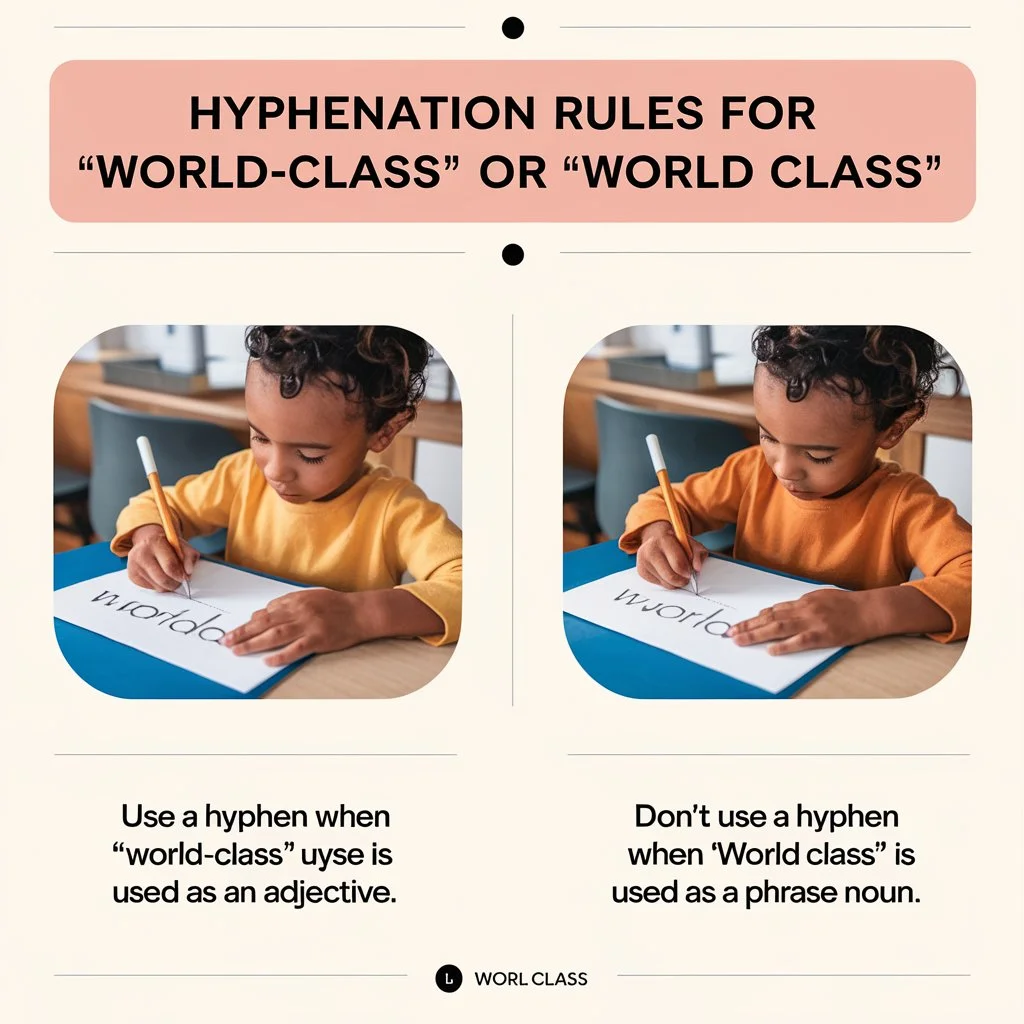Hyphenation rules are essential to grasp when you want to fully understand the English language. Words like world-class or world class can be hyphenated depending on their usage in a sentence. So, is world-class hyphenated? Understanding hyphenation rules is crucial for mastering the English language. Words like world-class and world class illustrate how the use of a hyphen can change meaning and function in a sentence.
The hyphenated form acts as an adjective, while the unhyphenated version serves as a phrase noun. Grasping when to use each form can enhance your writing clarity and ensure you convey the right message. In this exploration, we’ll break down the differences, provide examples, and offer alternatives to help you navigate these nuances with confidence.
World-Class or World Class – Hyphenated or Not?
When we discuss the world-class hyphen rule, we use the hyphenated form “world-class” to modify a noun or an object in a sentence. In this case, the hyphenated term functions as an adjective in the clause. Conversely, we use “world class” without a hyphen when it acts as a phrase noun, meaning it isn’t modifying any adjectives in the sentence.
Examples of When to Use “World-Class”
Now that we’ve explored the first instance of world-class versus world class, let’s examine a few examples of both. We will start with the hyphenated term “world-class,” used to modify a noun or object. Each time we use it in this way, the noun or object follows immediately:
- This is a world-class university.
- I support a world-class soccer team.
- He works at a world-class company.
- This is a world-class application.
- You’ll be a world-class sportsman if you keep that up.
- The company has a world-class reputation for innovation.
- She’s a world-class athlete who has won multiple gold medals.
- Our city is known for its world-class restaurants.
- They delivered a world-class performance at the concert last night.
- This is a world-class university, attracting students from all over the globe.
- His designs are considered world-class in the field of architecture.
- The team aims to build a world-class facility for the community.
- We provide world-class customer service, ensuring satisfaction at every step.
- This event will feature world-class speakers and panel discussions.
- The hotel offers world-class amenities, from luxury spas to fine dining.
- She has achieved world-class status in the field of science.
- Their world-class technology sets them apart from competitors.
- The museum houses a world-class collection of ancient art.
- His world-class leadership transformed the company’s direction.
- The chef prepared a world-class meal that left everyone impressed.
Examples of When to Use “World Class”
When we don’t hyphenate and instead keep it as two separate words, we use it as a noun. Since it’s written as two words, it’s referred to as a phrase noun (as a noun typically consists of one word). It’s worth noting that the popularity of “world class” without a hyphen is declining, and more people are opting for the hyphenated version as both an adjective and a noun.
- You are world class.
- This school is world class.
- They consider me world class.
- My dog is world class.
- Those athletes are world class.
- She delivered a world class performance in the final round.
- His dedication to excellence makes him a world class musician.
- They received world class training from the top experts in the field.
- Our organization strives to offer world class services to our clients.
- He is known for providing world class leadership in his company.
- Their athletes compete at a world class level every year.
- The hotel is famous for its world class hospitality and luxury.
- We visited a world class museum filled with rare artifacts.
- The scientists are working on a world class research project.
- She is known for her world class expertise in the field of technology.
- The students received world class education from renowned professors.
- He’s aiming for a world class ranking in the tennis tournament.
- They developed a world class strategy to improve their market position.
- The company is a leader in world class manufacturing techniques.
- He gave a world class presentation that impressed everyone in attendance.
Is World-Class Hyphenated in AP Style?
AP style guidelines clarify how hyphenation should work in English. Typically, we connect closely linked words to give the reader a clearer understanding of their meaning. According to the AP style rulebook, we hyphenate words when they are turned into an adjective that modifies a noun. Conversely, we leave the words unhyphenated when they do not modify any nouns in a sentence.
Examples
- She’s a world-class athlete known for her speed and agility.
- The city boasts world-class restaurants that attract tourists.
- He is recognized as a world-class engineer in his field.
- Their company has developed world-class technology for smartphones.
- The event featured world-class performers from around the globe.
- Our university provides world-class education to students worldwide.
- She received world-class training from renowned experts.
- The resort offers world-class amenities like private pools and spas.
- The team’s world-class performance earned them first place.
- They organized a world-class conference on climate change.
- His world-class skills in public speaking captivated the audience.
- The company’s world-class service sets them apart from competitors.
- The gallery exhibits world-class artwork by famous painters.
- The hotel is known for its world-class hospitality and comfort.
- She has achieved world-class status in the world of fashion design.
Should I Capitalize “Class” in “World-Class”?
Capitalization rules can add complexity when trying to understand hyphenation rules. Since two words become one in the hyphenated form “world-class,” it can be confusing to determine what should be capitalized in a title. Fortunately, the answer is more subjective than you might think, depending on your personal style. There are three main title styles to consider:
- Capitalize only the first word and any proper nouns; all other words remain lower case (this would include both words in “world-class”).
- Capitalize all words except for short prepositions, conjunctions, and articles; in this case, “world” is capitalized, but “class” is not.
- Capitalize all words in the title, meaning both “world” and “class” are capitalized, even though they form one word.
Alternatives to “World-Class”
We’ve covered the major differences between world class and world-class, so let’s explore some alternatives. These alternatives are great for replacing the hyphenated term if you find the rules confusing! Here are some singular words you can use:
- elite
- outstanding
- exceptional
- top
- prime
Quiz – World-Class or World Class?
To wrap up this article, here’s a quick quiz to test your understanding of the differences between the hyphenated and unhyphenated forms. Decide whether to use world class or world-class in each of the following sentences:
- They say he’s a (A. world-class / B. world class) athlete.
- My grades are considered (A. world-class / B. world class).
- This is a (A. world-class / B. world class) school. Nowhere else beats it.
- She is a (A. world-class / B. world class) lady.
- My parents are (A. world-class / B. world class).
Quiz Answers
- A
- B
- A
- A
- B
FAQs
What does “world-class” mean?
“World-class” refers to something that is among the best in the world in its category. It describes exceptional quality, expertise, or performance. This term is often used for athletes, businesses, or services that stand out globally. It’s a standard of excellence recognized by international standards.
When should “world-class” be hyphenated?
“World-class” should be hyphenated when used as a compound adjective before a noun. For example, “She is a world-class chef.” It helps clarify that the two words act together to modify the noun. Without the hyphen, the meaning may become ambiguous.
Can “world class” ever be written without a hyphen?
Yes, “world class” can be written without a hyphen when it appears after the noun it describes. For example, “The performance was world class.” In this case, the term functions more like a noun phrase than an adjective. The hyphen is only needed when it’s before the noun.
Is “world-class” used only in sports?
No, “world-class” is used in various fields, not just in sports. It can describe businesses, educational institutions, services, or even technology. Any person, service, or product that is regarded as exceptional on a global level can be described as world-class. The term is versatile across industries.
What makes something “world-class”?
To be considered “world-class,” something must demonstrate superior quality, performance, or skill compared to global standards. It involves consistent excellence and often requires innovation, hard work, and recognition by international audiences. World-class status is earned through reputation and proven success over time.
Can a small business be world-class?
Yes, a small business can be world-class if it provides outstanding products or services that stand up to international standards. World-class doesn’t depend on the size of the business but rather on its ability to deliver exceptional quality. Many small companies gain a reputation for excellence and attract global customers.
Is “world-class” formal or informal language?
“World-class” is considered formal language, suitable for professional and academic contexts. It’s used to emphasize excellence and is common in business, marketing, and journalism. While it’s formal, it’s also widely understood and can be used in less formal settings when discussing quality and performance.
Final Tips
In conclusion, the term “world-class” is a powerful way to describe excellence in any field. Whether it’s sports, business, or education, being world-class signifies the highest level of quality and performance. The correct usage, including hyphenation, ensures clarity and professionalism in writing. Achieving world-class status requires dedication, skill, and recognition on a global scale. Using this term effectively enhances the impact of your communication by highlighting exceptional standards.

It’s Elara Winters, your guide at “Grammer Grove.” I’ve dived into the intricacies of crafting the perfect English writing sections for your project, research paper, or thesis. With a wealth of experience in this field, I’m here to help you express gratitude and appreciation effectively. Join me on this journey, and let’s make your English writings shine!












